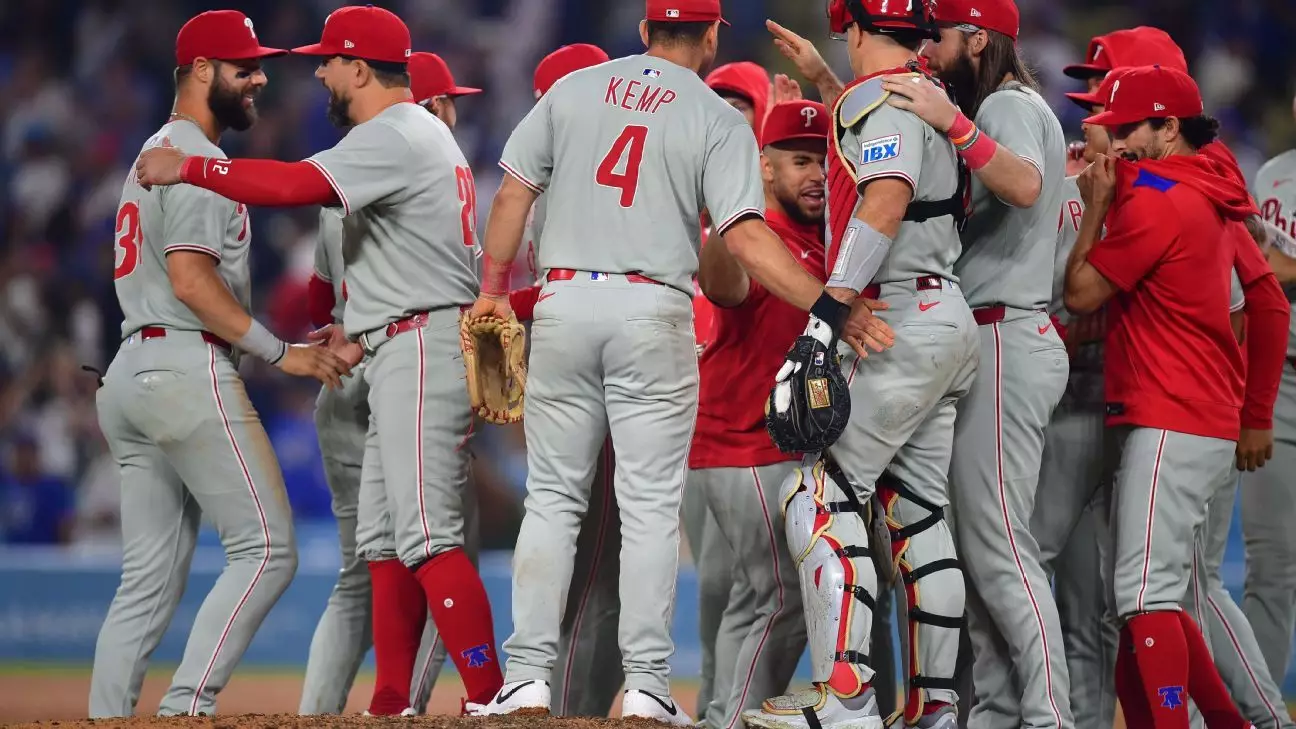The jubilant scenes at Dodger Stadium, where Bryce Harper’s exuberant Champagne shower and Kyle Schwarber’s wild beer-chugging display captured the moment, illustrate a team riding high on victory. Yet, beneath the champagne-soaked triumph lies a complex reality that questions whether this sudden success masks underlying vulnerabilities. While the Phillies’ fans bask in the glow of their team’s division title—secured in record time with a dramatic victory—the celebration risks obscuring the genuine challenges the team has faced all season. The fact that their journey to this point includes blown leads and injuries hints at an underlying fragility in their roster that cannot be fully addressed by short-term adrenaline or symbolic celebrations.
In sports, as in politics, triumphs often serve as a double-edged sword. Victory can momentarily paper over systemic issues—be it squad depth, resilience, or long-term planning—yet the same success raises questions about sustainability. In the case of the Phillies, their current form, while impressive, should be critically examined beyond the surface-level celebration. If they rely on mere grit and resilience to win close games, does this team have the capacity for sustained dominance, especially if key players like Trea Turner and Alec Bohm continue to face injuries? The celebration, although well-deserved, risks becoming a fleeting veneer if the deeper cracks in their foundation remain unaddressed.
Strategic Adaptability: The Key to Future Success
Philadelphia’s ability to clinch the division so swiftly speaks volumes about their on-field execution and managerial acumen. Manager Rob Thomson’s leadership, coupled with a roster that has exemplified resilience despite setbacks, is commendable. However, the narrative of adaptability—both strategic and mental—is what truly determines their future. The Phillies’ season, marked by a significant mid-season shake-up with trades and squad adjustments, reveals the importance of flexibility. Since July 31, their record of 29-14 reflects a team capable of recalibrating amid adversity, yet what remains uncertain is whether this adaptability is sustainable in the high-pressure environment of October.
Critical analysis suggests that the Phillies’ reliance on absences and emergency depth could expose them when faced with more formidable opponents in the postseason. Their ability to transform adversity into opportunity, leveraging their balanced approach—power hitting and small-ball tactics—demonstrates strategic maturity. But this flexibility must be tested further in the playoff landscape. Their pitching staff, notably depleted by Zack Wheeler’s injury, now depends heavily on depth and the willingness of players to step into unfamiliar roles. This will be a defining factor in whether the Phillies’ current success is an anomaly or a sign of long-term strength.
Leadership and Culture: Foundations of True Championship Teams
The Phillies’ managerial leadership under Thomson, who joins an elite group of coaches with consecutive division titles early in his tenure, hints at a positive team culture rooted in resilience and unity. Yet, leadership alone cannot sustain a team through the proverbial storm of playoff baseball. The dynamic exhibited by players such as Schwarber and Harper indicates a culture of fighting spirit, but does this translate into a mindset primarily driven by adrenaline rather than strategic discipline?
In the wider political context, leadership that inspires short-term morale without addressing systemic reforms often results in superficial gains. Similarly, in baseball, a team’s success rooted only in emotional momentum risks collapsing under the weight of high-stakes postseason pressure. Critical reflection points toward the necessity of fostering a culture that balances resilience with strategic patience, ensuring that mental toughness is paired with tactical discipline. For the Phillies, this means not only celebrating their rapid divisional conquest but also critically evaluating whether their leadership fosters a comprehensive mindset prepared for the rigors of October.
Injury Management and Depth: Are They Truly Prepared?
Injuries have punctuated the Phillies’ season, with key players sidelined yet the team still managing to thrive. The absence of Trea Turner and Alec Bohm underscores the importance of squad depth—a characteristic that often decides postseason success. Their ability to remain resilient in this context showcases a commendable adaptability, yet it should also prompt a cautious approach. Heavy reliance on depth and backup players can be a fragile proposition if not backed by solid planning and player development.
The decision to acquire players like Bader and Duran at the trade deadline hints at a strategic emphasis on bolstering their roster. However, whether this approach will withstand the crucible of a playoff race remains to be seen. The importance of injury management and depth is too often underestimated in the excitement of a pennant race. As the team prepares for postseason battles, their ability to maintain physical health and strategic flexibility will be pivotal—more so than their ability to party or celebrate at this moment.
A Critical Reflection on the Road Ahead
The Philadelphia Phillies’ journey to clinch the NL East so early in the season presents both a triumph and a cautionary tale. Celebrations like Schwarber’s “hose of beer” and Harper’s drink-over symbolize a team at a peak of confidence—yet, beneath these jubilant displays lies a pressing need for introspection. Success built on resilience and emotional toughness can propel a team to victory, but it is strategic discipline and sustainable depth that determine long-term greatness.
In the centrist liberal tradition, which values pragmatic optimism grounded in structure and adaptability, the Phillies’ story exemplifies a broader societal lesson. Celebrating victories is vital, but the true measure of a team’s or a country’s health lies not in transient victories but in their capacity to endure, adapt, and reform. The Phillies’ current success is promising but far from assured. The road to a World Series demands more than just moments of joy—it requires a careful, deliberate investment in long-term resilience, strategic innovation, and leadership integrity. Only then can their victory be truly meaningful and enduring.


Leave a Reply